The Role of HRM in Sustaining Stakeholder Value and Relationships
VerifiedAdded on 2023/06/08
|8
|2106
|333
Essay
AI Summary
This essay delves into the strategic importance of Human Resource Management (HRM) in fostering long-term stakeholder sustainability and value creation within organizations. It explores how HRM practices influence various stakeholders, including employees, line management, owners, and external customers, emphasizing the pressures and expectations placed upon HR professionals. The essay analyzes the four key factors of strategic HRM, including business strategies, organizational capabilities, culture, and technical competencies, and highlights the role of HR in information management and HR analytics. It further examines the impact of HRM on employee performance, line managers, and external customers, underscoring the importance of aligning HR practices with stakeholder expectations. The essay also discusses the challenges of meeting the conflicting needs of different stakeholders and the role of sustainable HRM in modern business operations, emphasizing the contribution of strategic HRM to organizational performance and stakeholder value. Finally, the essay concludes that effective HRM is essential for long-term profitability and sustainable value for both internal and external stakeholders.
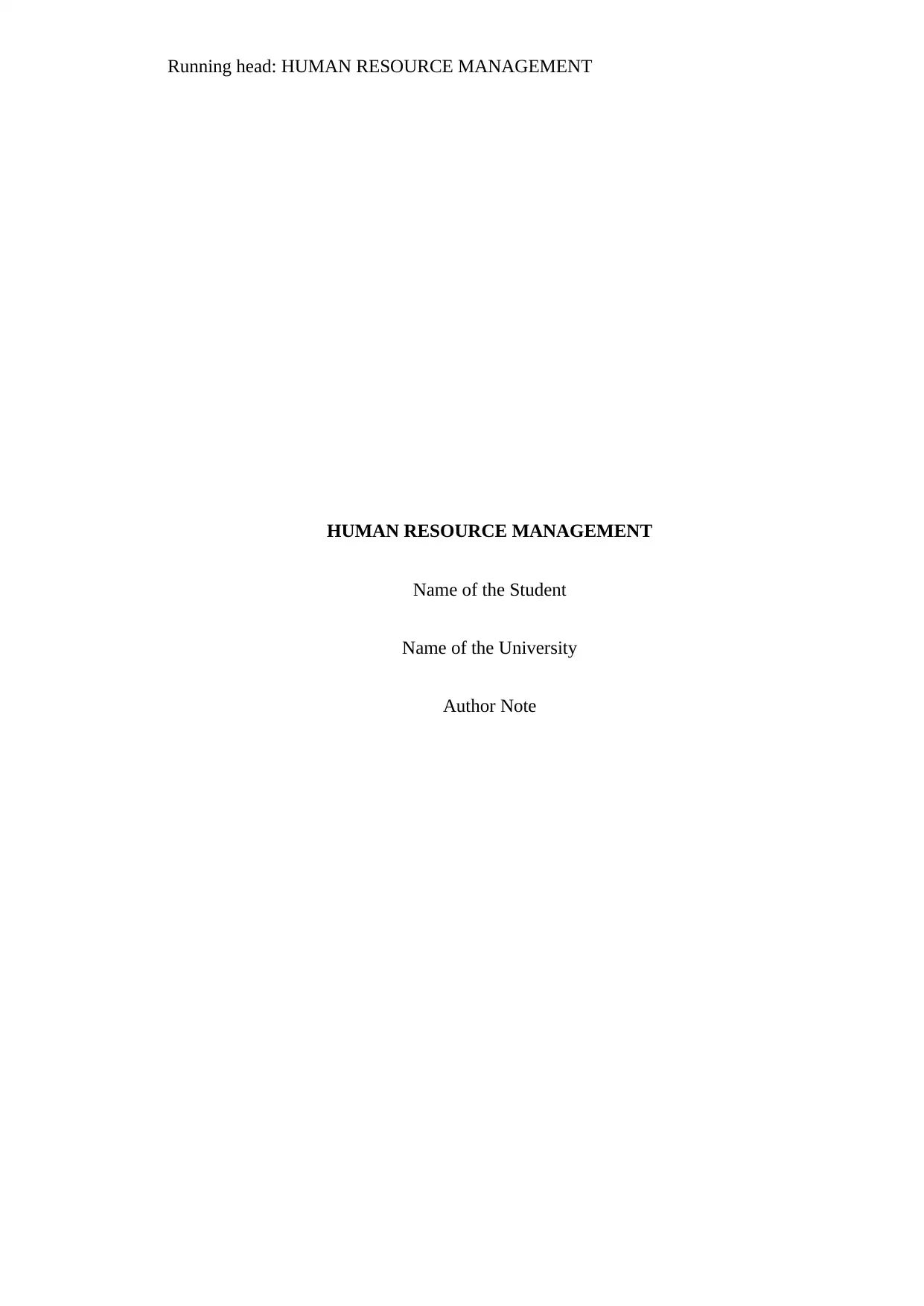
Running head: HUMAN RESOURCE MANAGEMENT
HUMAN RESOURCE MANAGEMENT
Name of the Student
Name of the University
Author Note
HUMAN RESOURCE MANAGEMENT
Name of the Student
Name of the University
Author Note
Paraphrase This Document
Need a fresh take? Get an instant paraphrase of this document with our AI Paraphraser
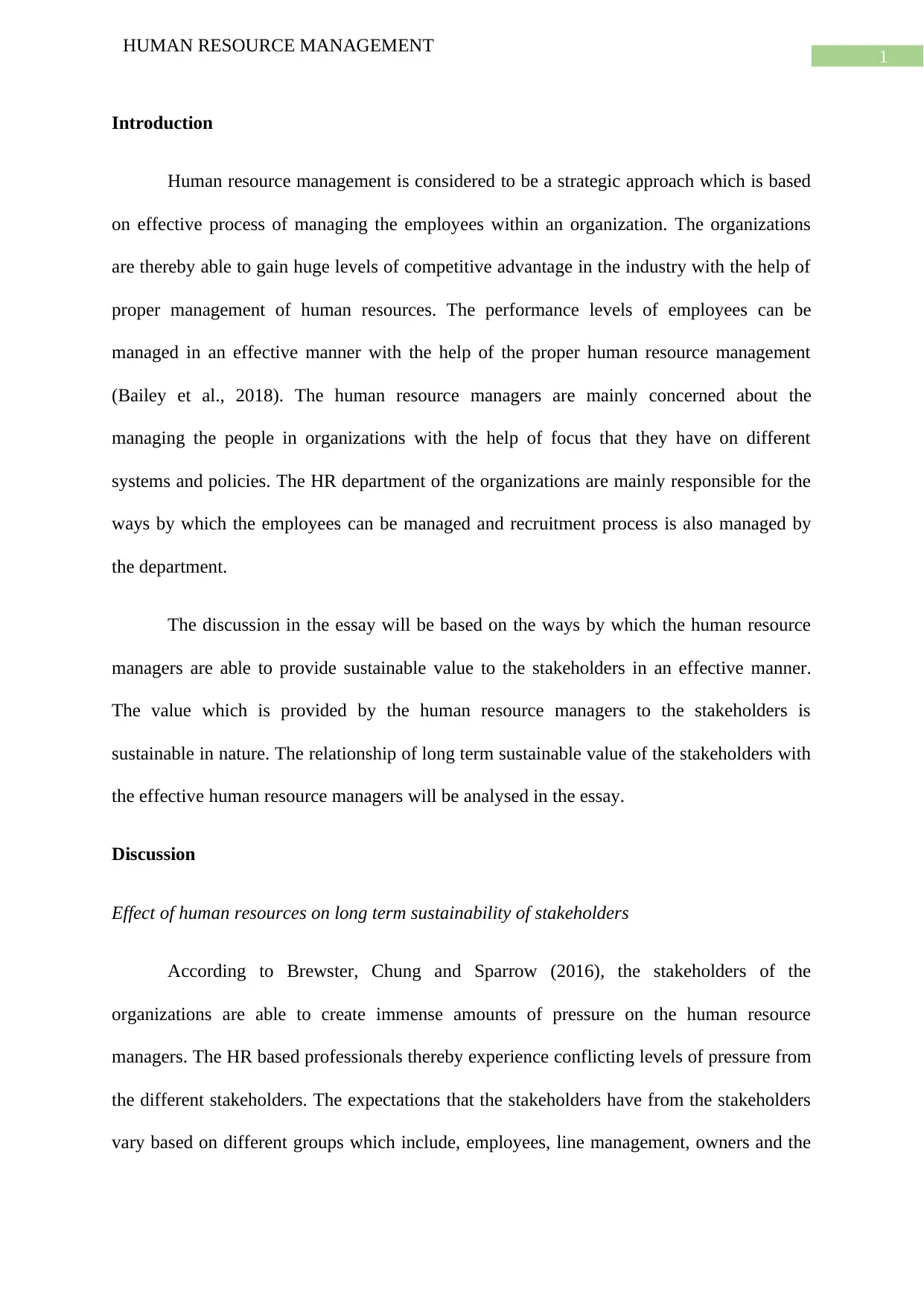
1
HUMAN RESOURCE MANAGEMENT
Introduction
Human resource management is considered to be a strategic approach which is based
on effective process of managing the employees within an organization. The organizations
are thereby able to gain huge levels of competitive advantage in the industry with the help of
proper management of human resources. The performance levels of employees can be
managed in an effective manner with the help of the proper human resource management
(Bailey et al., 2018). The human resource managers are mainly concerned about the
managing the people in organizations with the help of focus that they have on different
systems and policies. The HR department of the organizations are mainly responsible for the
ways by which the employees can be managed and recruitment process is also managed by
the department.
The discussion in the essay will be based on the ways by which the human resource
managers are able to provide sustainable value to the stakeholders in an effective manner.
The value which is provided by the human resource managers to the stakeholders is
sustainable in nature. The relationship of long term sustainable value of the stakeholders with
the effective human resource managers will be analysed in the essay.
Discussion
Effect of human resources on long term sustainability of stakeholders
According to Brewster, Chung and Sparrow (2016), the stakeholders of the
organizations are able to create immense amounts of pressure on the human resource
managers. The HR based professionals thereby experience conflicting levels of pressure from
the different stakeholders. The expectations that the stakeholders have from the stakeholders
vary based on different groups which include, employees, line management, owners and the
HUMAN RESOURCE MANAGEMENT
Introduction
Human resource management is considered to be a strategic approach which is based
on effective process of managing the employees within an organization. The organizations
are thereby able to gain huge levels of competitive advantage in the industry with the help of
proper management of human resources. The performance levels of employees can be
managed in an effective manner with the help of the proper human resource management
(Bailey et al., 2018). The human resource managers are mainly concerned about the
managing the people in organizations with the help of focus that they have on different
systems and policies. The HR department of the organizations are mainly responsible for the
ways by which the employees can be managed and recruitment process is also managed by
the department.
The discussion in the essay will be based on the ways by which the human resource
managers are able to provide sustainable value to the stakeholders in an effective manner.
The value which is provided by the human resource managers to the stakeholders is
sustainable in nature. The relationship of long term sustainable value of the stakeholders with
the effective human resource managers will be analysed in the essay.
Discussion
Effect of human resources on long term sustainability of stakeholders
According to Brewster, Chung and Sparrow (2016), the stakeholders of the
organizations are able to create immense amounts of pressure on the human resource
managers. The HR based professionals thereby experience conflicting levels of pressure from
the different stakeholders. The expectations that the stakeholders have from the stakeholders
vary based on different groups which include, employees, line management, owners and the
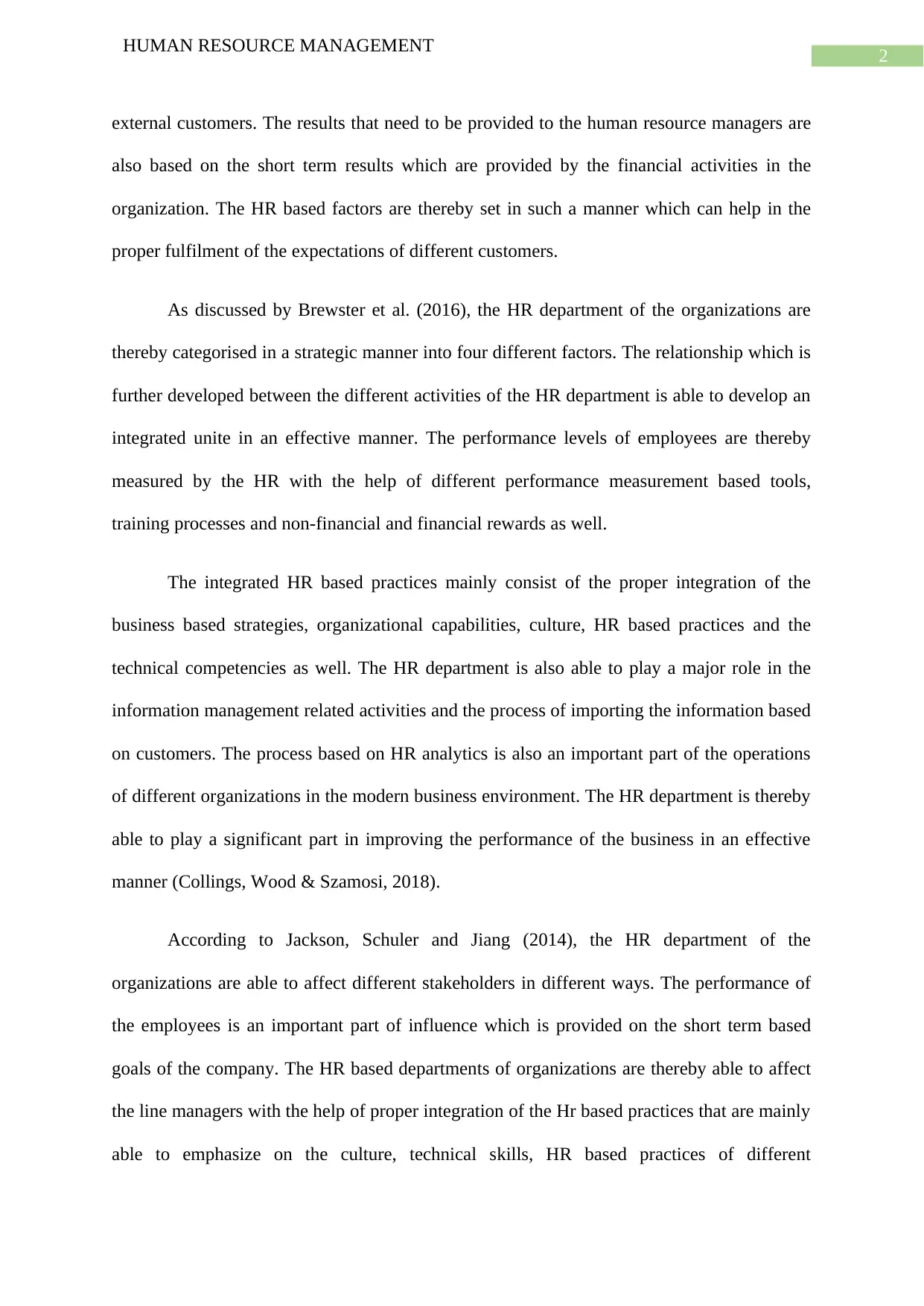
2
HUMAN RESOURCE MANAGEMENT
external customers. The results that need to be provided to the human resource managers are
also based on the short term results which are provided by the financial activities in the
organization. The HR based factors are thereby set in such a manner which can help in the
proper fulfilment of the expectations of different customers.
As discussed by Brewster et al. (2016), the HR department of the organizations are
thereby categorised in a strategic manner into four different factors. The relationship which is
further developed between the different activities of the HR department is able to develop an
integrated unite in an effective manner. The performance levels of employees are thereby
measured by the HR with the help of different performance measurement based tools,
training processes and non-financial and financial rewards as well.
The integrated HR based practices mainly consist of the proper integration of the
business based strategies, organizational capabilities, culture, HR based practices and the
technical competencies as well. The HR department is also able to play a major role in the
information management related activities and the process of importing the information based
on customers. The process based on HR analytics is also an important part of the operations
of different organizations in the modern business environment. The HR department is thereby
able to play a significant part in improving the performance of the business in an effective
manner (Collings, Wood & Szamosi, 2018).
According to Jackson, Schuler and Jiang (2014), the HR department of the
organizations are able to affect different stakeholders in different ways. The performance of
the employees is an important part of influence which is provided on the short term based
goals of the company. The HR based departments of organizations are thereby able to affect
the line managers with the help of proper integration of the Hr based practices that are mainly
able to emphasize on the culture, technical skills, HR based practices of different
HUMAN RESOURCE MANAGEMENT
external customers. The results that need to be provided to the human resource managers are
also based on the short term results which are provided by the financial activities in the
organization. The HR based factors are thereby set in such a manner which can help in the
proper fulfilment of the expectations of different customers.
As discussed by Brewster et al. (2016), the HR department of the organizations are
thereby categorised in a strategic manner into four different factors. The relationship which is
further developed between the different activities of the HR department is able to develop an
integrated unite in an effective manner. The performance levels of employees are thereby
measured by the HR with the help of different performance measurement based tools,
training processes and non-financial and financial rewards as well.
The integrated HR based practices mainly consist of the proper integration of the
business based strategies, organizational capabilities, culture, HR based practices and the
technical competencies as well. The HR department is also able to play a major role in the
information management related activities and the process of importing the information based
on customers. The process based on HR analytics is also an important part of the operations
of different organizations in the modern business environment. The HR department is thereby
able to play a significant part in improving the performance of the business in an effective
manner (Collings, Wood & Szamosi, 2018).
According to Jackson, Schuler and Jiang (2014), the HR department of the
organizations are able to affect different stakeholders in different ways. The performance of
the employees is an important part of influence which is provided on the short term based
goals of the company. The HR based departments of organizations are thereby able to affect
the line managers with the help of proper integration of the Hr based practices that are mainly
able to emphasize on the culture, technical skills, HR based practices of different
⊘ This is a preview!⊘
Do you want full access?
Subscribe today to unlock all pages.

Trusted by 1+ million students worldwide

3
HUMAN RESOURCE MANAGEMENT
organizations. The focus of the HR department is clear and is based on the ways by which the
expectations of internal stakeholders can be met. The line managers of the organizations are
influenced by the human resource departments of organizations.
The HR department needs to focus on the agendas which have been developed in an
effective manner in order to create sustainable levels of value for the external customers. The
information of the company can flow in a proper way with the help of proper functioning of
the HR department. The HR departments are able to play the most important role in the ways
by which the organizations are able to improve their operations in an effective manner. The
different researches have been able to show HR department has 45% influence on the
external customers and 36% influence on the different investors of the organization (Jamali,
Dirani & Harwood, 2015).
The major role is thereby played by HR in the management of information based
system in an effective manner. The HR analytics based process has a modest impact on the
stakeholders of the company. The HR measurement based policies have also started in the
current business based environment. These measurements thereby need to be included within
the HR practices for proper operations of the modern companies. The balance which needs to
be maintained between the different HR based operations and the stakeholders is an
important part of the operations of the department in modern business based environment.
The HR practices have a major impact on different levels of the organizations (Kramar,
2014).
The HR based practices are thereby able to affect the collective stakeholders in a huge
manner. The organizations emphasize on the different stakeholders in a different manner. The
major challenge in this case is thereby to understand the levels of importance of different
stakeholders. The HR departments of different organizations are thereby required to meet the
HUMAN RESOURCE MANAGEMENT
organizations. The focus of the HR department is clear and is based on the ways by which the
expectations of internal stakeholders can be met. The line managers of the organizations are
influenced by the human resource departments of organizations.
The HR department needs to focus on the agendas which have been developed in an
effective manner in order to create sustainable levels of value for the external customers. The
information of the company can flow in a proper way with the help of proper functioning of
the HR department. The HR departments are able to play the most important role in the ways
by which the organizations are able to improve their operations in an effective manner. The
different researches have been able to show HR department has 45% influence on the
external customers and 36% influence on the different investors of the organization (Jamali,
Dirani & Harwood, 2015).
The major role is thereby played by HR in the management of information based
system in an effective manner. The HR analytics based process has a modest impact on the
stakeholders of the company. The HR measurement based policies have also started in the
current business based environment. These measurements thereby need to be included within
the HR practices for proper operations of the modern companies. The balance which needs to
be maintained between the different HR based operations and the stakeholders is an
important part of the operations of the department in modern business based environment.
The HR practices have a major impact on different levels of the organizations (Kramar,
2014).
The HR based practices are thereby able to affect the collective stakeholders in a huge
manner. The organizations emphasize on the different stakeholders in a different manner. The
major challenge in this case is thereby to understand the levels of importance of different
stakeholders. The HR departments of different organizations are thereby required to meet the
Paraphrase This Document
Need a fresh take? Get an instant paraphrase of this document with our AI Paraphraser
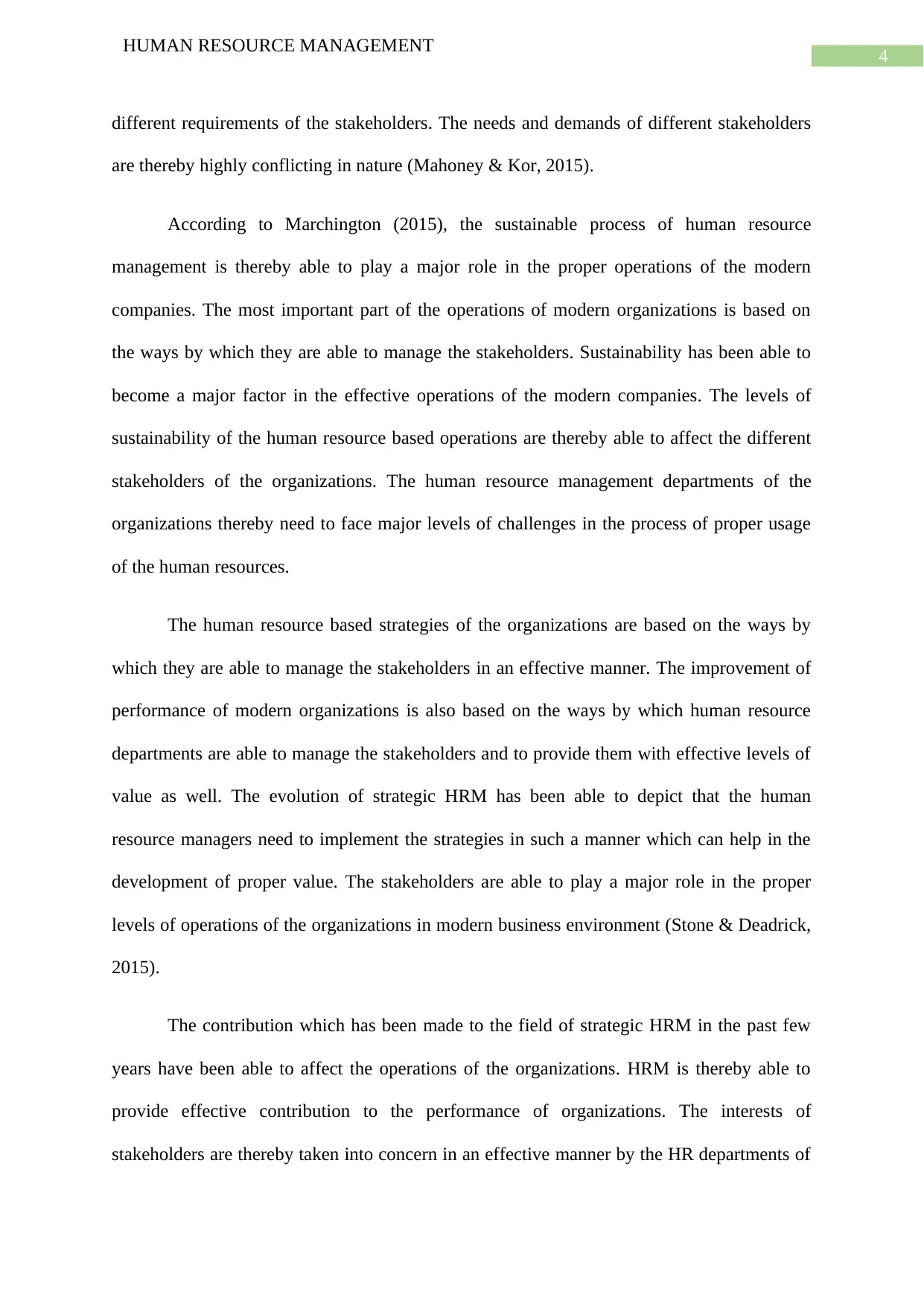
4
HUMAN RESOURCE MANAGEMENT
different requirements of the stakeholders. The needs and demands of different stakeholders
are thereby highly conflicting in nature (Mahoney & Kor, 2015).
According to Marchington (2015), the sustainable process of human resource
management is thereby able to play a major role in the proper operations of the modern
companies. The most important part of the operations of modern organizations is based on
the ways by which they are able to manage the stakeholders. Sustainability has been able to
become a major factor in the effective operations of the modern companies. The levels of
sustainability of the human resource based operations are thereby able to affect the different
stakeholders of the organizations. The human resource management departments of the
organizations thereby need to face major levels of challenges in the process of proper usage
of the human resources.
The human resource based strategies of the organizations are based on the ways by
which they are able to manage the stakeholders in an effective manner. The improvement of
performance of modern organizations is also based on the ways by which human resource
departments are able to manage the stakeholders and to provide them with effective levels of
value as well. The evolution of strategic HRM has been able to depict that the human
resource managers need to implement the strategies in such a manner which can help in the
development of proper value. The stakeholders are able to play a major role in the proper
levels of operations of the organizations in modern business environment (Stone & Deadrick,
2015).
The contribution which has been made to the field of strategic HRM in the past few
years have been able to affect the operations of the organizations. HRM is thereby able to
provide effective contribution to the performance of organizations. The interests of
stakeholders are thereby taken into concern in an effective manner by the HR departments of
HUMAN RESOURCE MANAGEMENT
different requirements of the stakeholders. The needs and demands of different stakeholders
are thereby highly conflicting in nature (Mahoney & Kor, 2015).
According to Marchington (2015), the sustainable process of human resource
management is thereby able to play a major role in the proper operations of the modern
companies. The most important part of the operations of modern organizations is based on
the ways by which they are able to manage the stakeholders. Sustainability has been able to
become a major factor in the effective operations of the modern companies. The levels of
sustainability of the human resource based operations are thereby able to affect the different
stakeholders of the organizations. The human resource management departments of the
organizations thereby need to face major levels of challenges in the process of proper usage
of the human resources.
The human resource based strategies of the organizations are based on the ways by
which they are able to manage the stakeholders in an effective manner. The improvement of
performance of modern organizations is also based on the ways by which human resource
departments are able to manage the stakeholders and to provide them with effective levels of
value as well. The evolution of strategic HRM has been able to depict that the human
resource managers need to implement the strategies in such a manner which can help in the
development of proper value. The stakeholders are able to play a major role in the proper
levels of operations of the organizations in modern business environment (Stone & Deadrick,
2015).
The contribution which has been made to the field of strategic HRM in the past few
years have been able to affect the operations of the organizations. HRM is thereby able to
provide effective contribution to the performance of organizations. The interests of
stakeholders are thereby taken into concern in an effective manner by the HR departments of
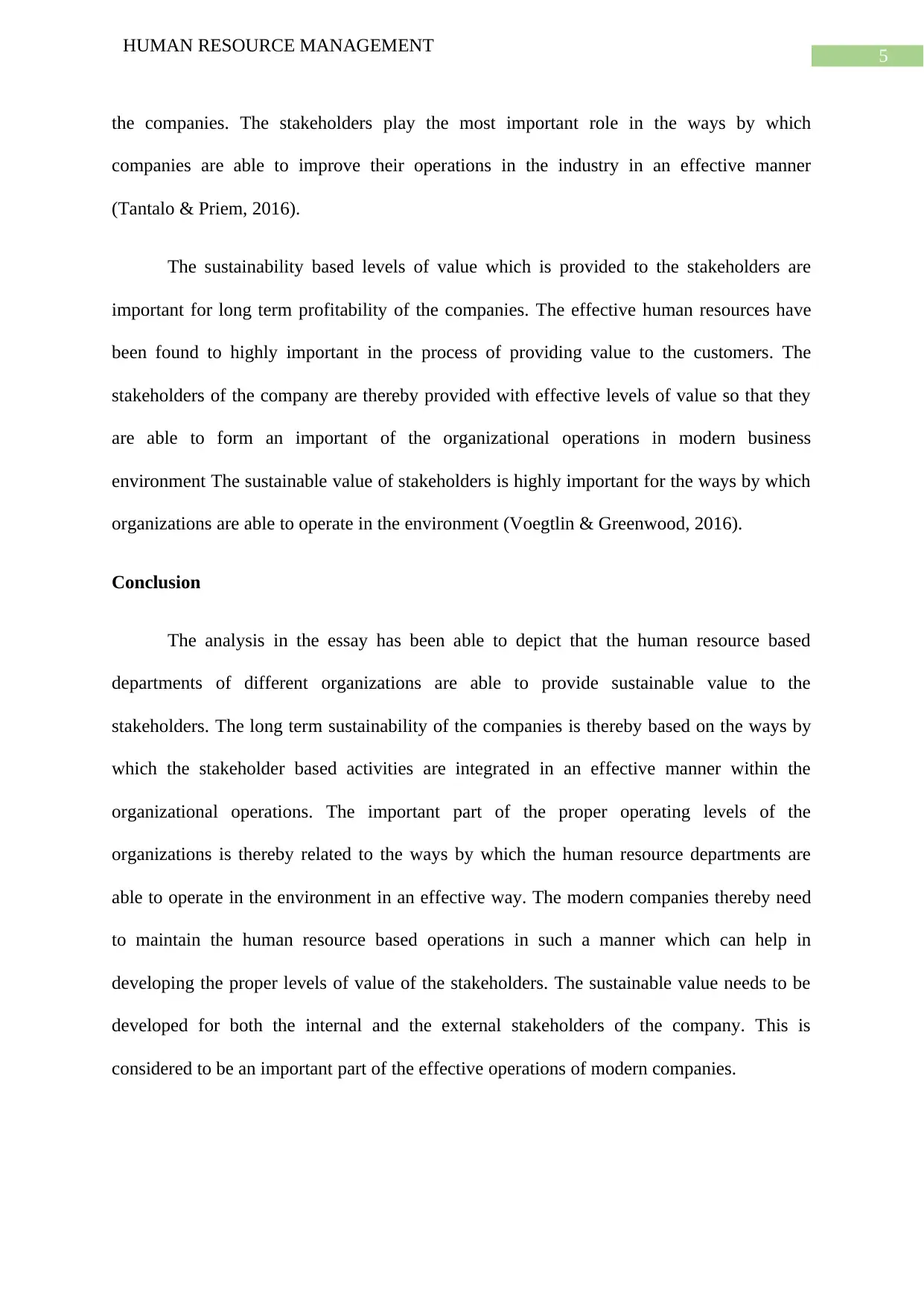
5
HUMAN RESOURCE MANAGEMENT
the companies. The stakeholders play the most important role in the ways by which
companies are able to improve their operations in the industry in an effective manner
(Tantalo & Priem, 2016).
The sustainability based levels of value which is provided to the stakeholders are
important for long term profitability of the companies. The effective human resources have
been found to highly important in the process of providing value to the customers. The
stakeholders of the company are thereby provided with effective levels of value so that they
are able to form an important of the organizational operations in modern business
environment The sustainable value of stakeholders is highly important for the ways by which
organizations are able to operate in the environment (Voegtlin & Greenwood, 2016).
Conclusion
The analysis in the essay has been able to depict that the human resource based
departments of different organizations are able to provide sustainable value to the
stakeholders. The long term sustainability of the companies is thereby based on the ways by
which the stakeholder based activities are integrated in an effective manner within the
organizational operations. The important part of the proper operating levels of the
organizations is thereby related to the ways by which the human resource departments are
able to operate in the environment in an effective way. The modern companies thereby need
to maintain the human resource based operations in such a manner which can help in
developing the proper levels of value of the stakeholders. The sustainable value needs to be
developed for both the internal and the external stakeholders of the company. This is
considered to be an important part of the effective operations of modern companies.
HUMAN RESOURCE MANAGEMENT
the companies. The stakeholders play the most important role in the ways by which
companies are able to improve their operations in the industry in an effective manner
(Tantalo & Priem, 2016).
The sustainability based levels of value which is provided to the stakeholders are
important for long term profitability of the companies. The effective human resources have
been found to highly important in the process of providing value to the customers. The
stakeholders of the company are thereby provided with effective levels of value so that they
are able to form an important of the organizational operations in modern business
environment The sustainable value of stakeholders is highly important for the ways by which
organizations are able to operate in the environment (Voegtlin & Greenwood, 2016).
Conclusion
The analysis in the essay has been able to depict that the human resource based
departments of different organizations are able to provide sustainable value to the
stakeholders. The long term sustainability of the companies is thereby based on the ways by
which the stakeholder based activities are integrated in an effective manner within the
organizational operations. The important part of the proper operating levels of the
organizations is thereby related to the ways by which the human resource departments are
able to operate in the environment in an effective way. The modern companies thereby need
to maintain the human resource based operations in such a manner which can help in
developing the proper levels of value of the stakeholders. The sustainable value needs to be
developed for both the internal and the external stakeholders of the company. This is
considered to be an important part of the effective operations of modern companies.
⊘ This is a preview!⊘
Do you want full access?
Subscribe today to unlock all pages.

Trusted by 1+ million students worldwide
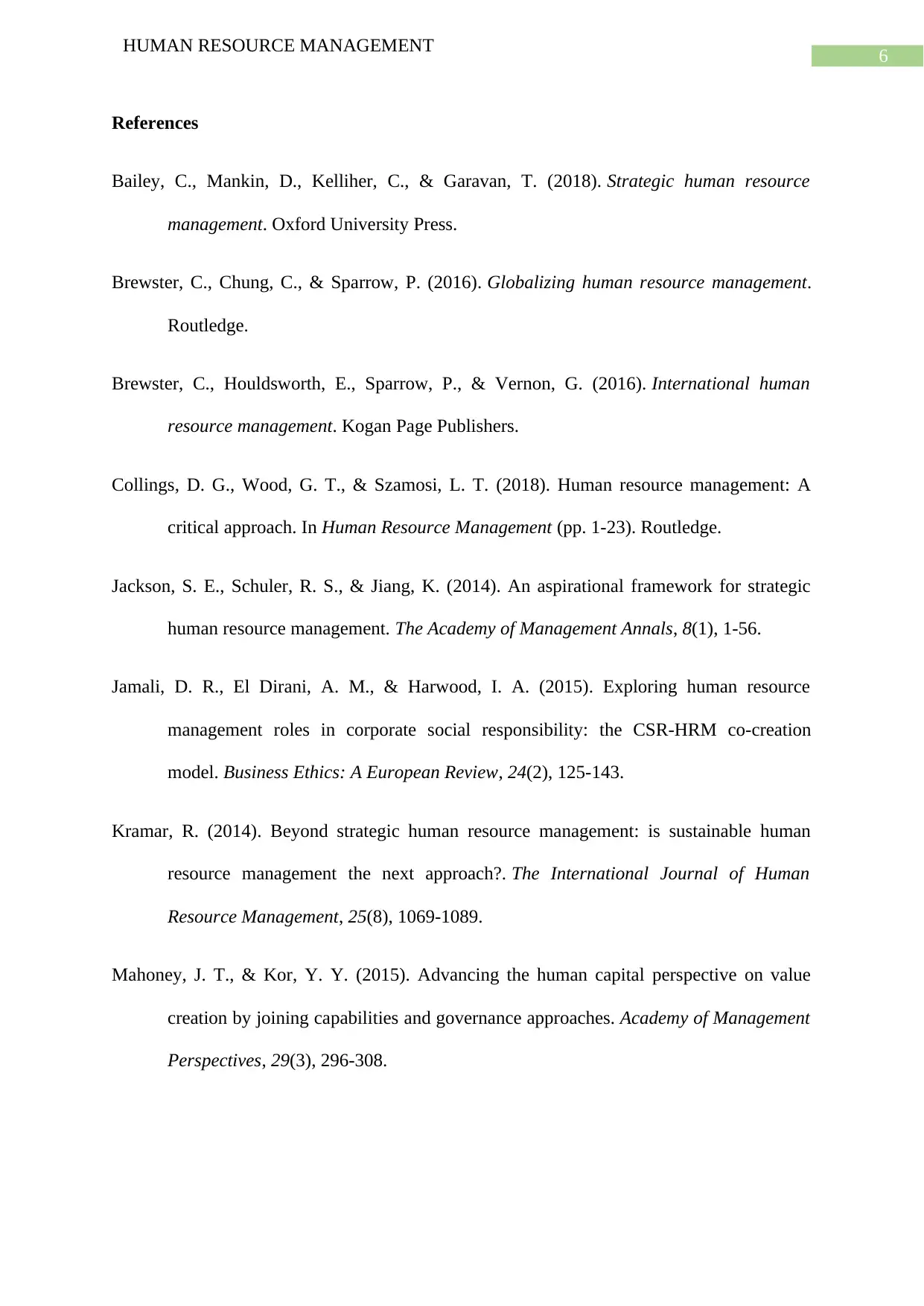
6
HUMAN RESOURCE MANAGEMENT
References
Bailey, C., Mankin, D., Kelliher, C., & Garavan, T. (2018). Strategic human resource
management. Oxford University Press.
Brewster, C., Chung, C., & Sparrow, P. (2016). Globalizing human resource management.
Routledge.
Brewster, C., Houldsworth, E., Sparrow, P., & Vernon, G. (2016). International human
resource management. Kogan Page Publishers.
Collings, D. G., Wood, G. T., & Szamosi, L. T. (2018). Human resource management: A
critical approach. In Human Resource Management (pp. 1-23). Routledge.
Jackson, S. E., Schuler, R. S., & Jiang, K. (2014). An aspirational framework for strategic
human resource management. The Academy of Management Annals, 8(1), 1-56.
Jamali, D. R., El Dirani, A. M., & Harwood, I. A. (2015). Exploring human resource
management roles in corporate social responsibility: the CSR‐HRM co‐creation
model. Business Ethics: A European Review, 24(2), 125-143.
Kramar, R. (2014). Beyond strategic human resource management: is sustainable human
resource management the next approach?. The International Journal of Human
Resource Management, 25(8), 1069-1089.
Mahoney, J. T., & Kor, Y. Y. (2015). Advancing the human capital perspective on value
creation by joining capabilities and governance approaches. Academy of Management
Perspectives, 29(3), 296-308.
HUMAN RESOURCE MANAGEMENT
References
Bailey, C., Mankin, D., Kelliher, C., & Garavan, T. (2018). Strategic human resource
management. Oxford University Press.
Brewster, C., Chung, C., & Sparrow, P. (2016). Globalizing human resource management.
Routledge.
Brewster, C., Houldsworth, E., Sparrow, P., & Vernon, G. (2016). International human
resource management. Kogan Page Publishers.
Collings, D. G., Wood, G. T., & Szamosi, L. T. (2018). Human resource management: A
critical approach. In Human Resource Management (pp. 1-23). Routledge.
Jackson, S. E., Schuler, R. S., & Jiang, K. (2014). An aspirational framework for strategic
human resource management. The Academy of Management Annals, 8(1), 1-56.
Jamali, D. R., El Dirani, A. M., & Harwood, I. A. (2015). Exploring human resource
management roles in corporate social responsibility: the CSR‐HRM co‐creation
model. Business Ethics: A European Review, 24(2), 125-143.
Kramar, R. (2014). Beyond strategic human resource management: is sustainable human
resource management the next approach?. The International Journal of Human
Resource Management, 25(8), 1069-1089.
Mahoney, J. T., & Kor, Y. Y. (2015). Advancing the human capital perspective on value
creation by joining capabilities and governance approaches. Academy of Management
Perspectives, 29(3), 296-308.
Paraphrase This Document
Need a fresh take? Get an instant paraphrase of this document with our AI Paraphraser
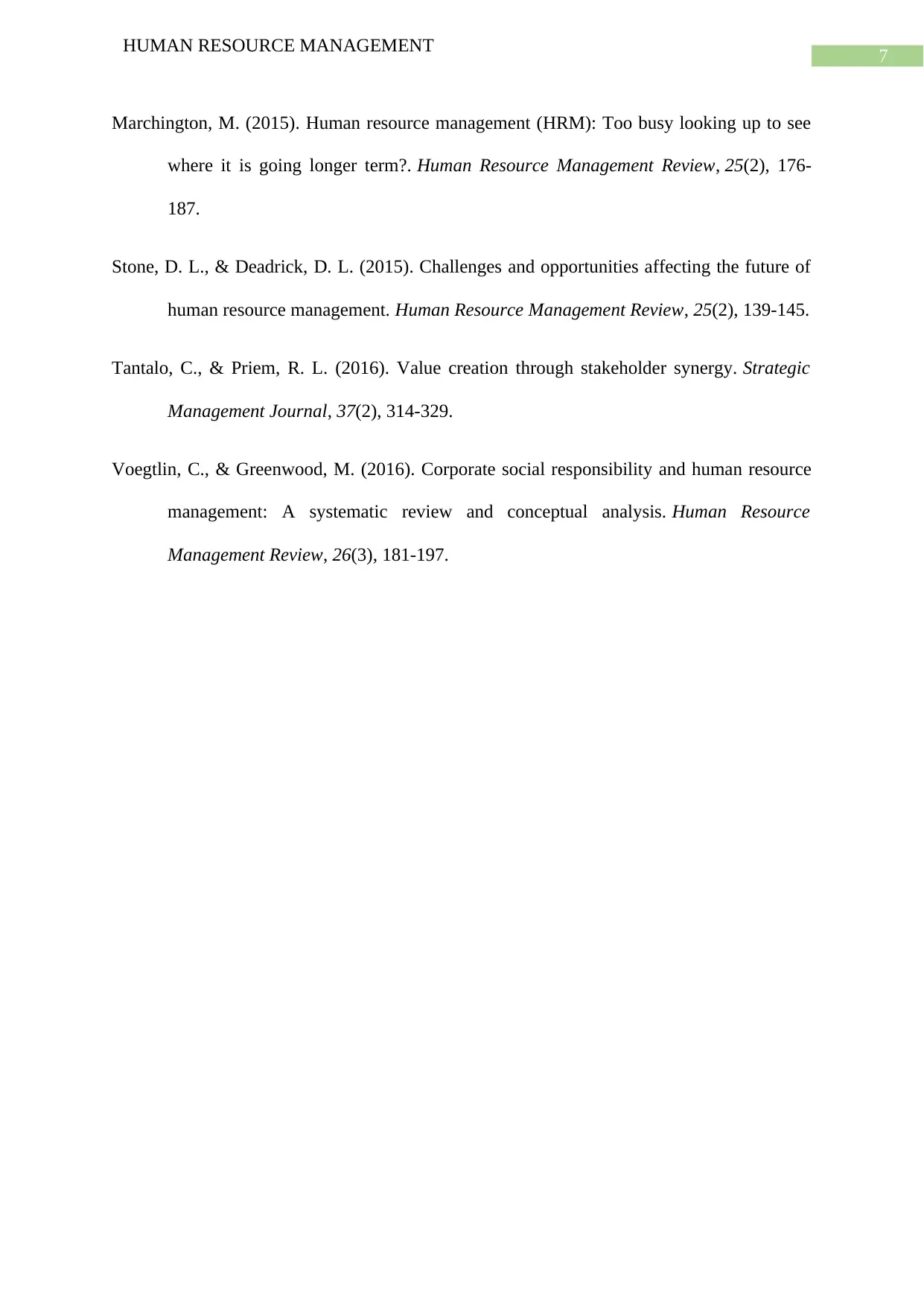
7
HUMAN RESOURCE MANAGEMENT
Marchington, M. (2015). Human resource management (HRM): Too busy looking up to see
where it is going longer term?. Human Resource Management Review, 25(2), 176-
187.
Stone, D. L., & Deadrick, D. L. (2015). Challenges and opportunities affecting the future of
human resource management. Human Resource Management Review, 25(2), 139-145.
Tantalo, C., & Priem, R. L. (2016). Value creation through stakeholder synergy. Strategic
Management Journal, 37(2), 314-329.
Voegtlin, C., & Greenwood, M. (2016). Corporate social responsibility and human resource
management: A systematic review and conceptual analysis. Human Resource
Management Review, 26(3), 181-197.
HUMAN RESOURCE MANAGEMENT
Marchington, M. (2015). Human resource management (HRM): Too busy looking up to see
where it is going longer term?. Human Resource Management Review, 25(2), 176-
187.
Stone, D. L., & Deadrick, D. L. (2015). Challenges and opportunities affecting the future of
human resource management. Human Resource Management Review, 25(2), 139-145.
Tantalo, C., & Priem, R. L. (2016). Value creation through stakeholder synergy. Strategic
Management Journal, 37(2), 314-329.
Voegtlin, C., & Greenwood, M. (2016). Corporate social responsibility and human resource
management: A systematic review and conceptual analysis. Human Resource
Management Review, 26(3), 181-197.
1 out of 8
Related Documents
Your All-in-One AI-Powered Toolkit for Academic Success.
+13062052269
info@desklib.com
Available 24*7 on WhatsApp / Email
![[object Object]](/_next/static/media/star-bottom.7253800d.svg)
Unlock your academic potential
Copyright © 2020–2026 A2Z Services. All Rights Reserved. Developed and managed by ZUCOL.





